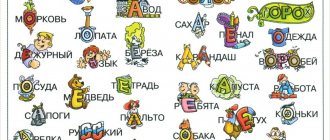Probably, many have at least once encountered our ordinary Russian words in literature or heard them in films of the 19th century, but with the letter “s” added to their end. For example, “no, sir,” “excuse me, sir.” For what reason was this done and what was its significance?
Slover
It turns out that the particle “s” added to a word in any part of speech is called a word word, and this form of address or speech was used only in special cases. At the beginning of the 19th century, these words were spoken to people who were revered and respected.
Typically, this form of speech was used in conversations at work between partners or colleagues, with strangers, or at holiday celebrations.
The ending s for verbs in English
When to use the ending s in English
The 3rd person singular in English is determined by a noun or pronoun (subject). The pronouns he, she, it, or nouns that can be replaced by these pronouns, will be markers that determine the need for -s at the end of verbs in English in the Present Simple form.
Greta (she) prefers chips with cheese sauce. – Greta (she) prefers chips with cheese sauce.
Yan (he) dresses his son in the morning. – Jan (he) dresses his son in the morning.
Tilda and Melissa (they) try to learn Spanish. – Tilda and Melissa (they) are trying to learn Spanish.
How to write English verbs ending in –s (-es)
When adding endings to English words, be aware that these endings can affect the spelling of the word. The rules for adding the ending s to English verbs in the 3rd person singular form can be presented in the form of a table:
| The word ends with... | -es or -s | Example | Translation |
| hissing/whistle sound (ch, sh, s, ss, -z, -x) | -es | He mixes English and Spanish words, it's really funny. | He mixes English and Spanish words, it's really funny. |
| –o | -es | Lima does her hair once a week. | Lima gets her hair done once a week. |
| vowel plus -y | -s | Lima st ays at school till late. | Lima stays at school late. |
| consonant plus -y | -es (-y changes to –i) | Lima's father always carr ies out his promises | Lima's father always keeps his promises. |
| all other words | -s | Rebecca usually pi ns the messages to the door. | Rebecca usually puts notes on the door. |
How to pronounce English verbs ending in –s (-es)
The ending –s (-es) can be pronounced in three different ways. It can be conveyed by the sounds [s], [z], [iz]. The pronunciation option, as well as spelling, depends on the sound with which the verb ends.
| [s] | [z] | [iz] |
| after a voiceless consonant | h i ts [hit] | |
| after a voiced consonant | d ive [daiv z ] | |
| after a hissing/whistle sound (ending es in English ) | p ass es [pa:s iz ] |
When a verb in the Present Simple does not need an ending –s (-s)
As already mentioned, in the third person singular tense of the Present Simple, the verb needs the ending –s. But according to the rules of this time, such an ending is added to the verb only in affirmative sentences.
As follows from the rule, in negatives and questions an auxiliary verb comes to the aid of the semantic verb. In the case of the Present Simple, this is the verb do. It is used in all forms except the 3rd person singular.
Do they often repeat these words? – Do they often repeat these words?
They don't often repeat these words. “They don’t repeat these words often.”
At the same time, in the 3rd person singular. the number ending does not go away - it moves from the main verb to the auxiliary one. Thus, do turns into does.
Lima adores such kind of scent. – Lima loves this smell.
Lima doesn't like such kind of scent. – Lima doesn’t like this smell.
Does Lima adore such kind of scent? – Does Lima love this smell?
As we can see from the examples, verbs in the 3rd person singular in interrogative and negative forms are freed from the ending –s.
What other English verbs have an –s ending?
The third person singular category is generally very useful to remember in order to correctly use a number of English rules. The ending –s can be seen not only in the verbs of this person in the present simple tense. We see traces of it in such forms as:
- is
- was
- has
All these forms are also used in the 3rd person singular. numbers.
To correctly use endings in English, the table of which is given above, you need not only to know the rule, but also to practice regularly. Present Simple is the simplest tense in the English language. And the most common mistake students make is missing the ending of a 3rd person verb. At first, everyone does it without exception. Don’t forget about this feature, do the exercises, speak more - and mistakes will disappear from your speech.
Why “slover”?
This definition of the particle “c” was given by the very alphabet of the educational system of people of the 19th century. As many already know, the letter “a” was pronounced as “az”, the letter “b” as “buki” and so on.
But the letter “s” was spoken as a “word”. But in those days, “ъ” was also often added to the end of words, which also had its own name — “er”. This is how the word “dictionary” came about.
Using an apostrophe to indicate ownership
- We put an apostrophe before “ s ” when something (someone) belongs to someone (something) and the owner is singular.
a baby's toy ; Hannah's kitten ; a child's cry ; girl's doll ; boy's balls .
It doesn’t matter how many things the owner has (there is only one doll, but there are many balls). The only important thing is that the owner is indicated in the singular - a girl and a boy.
- And if there are already several owners (or something), then the apostrophe is placed after “ s ”.
We'll take my parents' car for a ride! - Let's go take my ancestors' car for a ride. Your grandparents are your parents' parents. Wow! – Your grandparents are your parents’ parents. Wow! We're fighting for workers' rights. – We fight for workers' rights. It's a ladies' fashion dream. – This is the dream of every fashionista.
Of course, there are also such atypical nouns, the plural of which is formed in a different way. In such cases, the apostrophe is placed in the same place as in the case of singular nouns, since such words do not end in “s”:
children's toys (toys for children); women's magazine (magazine for women); men's work (men's work); 's lives ; fish's tails (fish tails); sheep's heads (sheep heads).
By the way, remember that “aircraft” in the plural will remain “aircraft”?
- Place between two “ s ” after singular names ending in “s”.
In general there are 2 options here:
Charles' or Charles's book; the octopus' tentacles or the octopus's tentacles.
Both options are grammatically correct . However, based on the rules, the second one will be more correct, given that the noun “Charles” is singular. But the first one is easier
However, based on the rules, the second one will be more correct, given that the noun “Charles” is singular. But the first one is easier
- Also, an apostrophe + “s” is used when the sentence talks about joint ownership of something. In this case, it is placed after the last name .
The man and woman’s car was badly damaged. – The man and woman’s car was badly damaged. We like Jade and Simon's new products . – We love Jade and Simon's new products (meaning that the new products were jointly invented by Jade and Simon).
And if it were “ Jade’s and Simon’s new products,” then this would mean that they made/released completely different new products and not at all jointly.
The student’s and the teacher’s ideas were in conflict. – The ideas of the student and the teacher contradicted each other.
- If a compound noun belongs to another noun, add an apostrophe only to its final element .
My sister-in-law’s love of shopping knows no limits. – My daughter-in-law’s passion for shopping knows no bounds. The president-elect’s agenda proposed no major policy changes. – The new president’s action program does not imply major policy shifts.
- If the noun belongs to an indefinite pronoun, then an apostrophe + “s” is also added .
Does anybody's key fit this lock? - Does anyone have a key to this lock? Someone's car is parked in the loading zone. - Someone's car is parked in the loading zone.
- An apostrophe + "s" is added at the end of certain professions or positions to indicate place of employment.
She's on her way to the doctor's . “She’s already on her way to the doctor.” He's at the hairdresser's . - He's at the hairdresser. I'm gonna hit the butcher's on my way back. “I’ll drop by the butcher shop on the way back.”
The following examples of the use of apostrophe will also be interesting:
The text must go to the printer’s (the text must go to print). Rates are lower than other companies' (rates are lower than other companies.
The apostrophe is placed here because the sentences refer to “the printer's company” and “other companies' rates” (the words “company” and “rates” are simply omitted).
- If the name is classical Greek, or if it is a historical figure or building, then the apostrophe is added only in special cases .
For example:
Dickens' novels St Giles' Cathedral Jesus' nativity Moses' parting Sophocles' plays
- An apostrophe + "s" is always used when talking about time periods.
For example, “one month's holiday”, “four hours' delay” (four hour delay).
Just remember that holidays refer to months (singular) and delays refer to hours (plural).
Abbreviation of a word
It is false to think that the particle “s” is just a letter that gives a more respectful tone to the conversation. In fact, underneath it was hidden a more detailed word “sir” or “madam”. The word "sir" is also a shortened version of the word "sovereign". Therefore, when pronouncing “Sorry, sir,” the interlocutor actually means “Sorry, sir.”
In the Russian language of that time there were a lot of abbreviated words and addresses. Most likely, many have heard such addresses as “your brod,” which meant “your honor.”
Polite treatment
Almost every language has words for politely addressing a person. For example, in England - “sir”, “ma’am”, “miss”, in France - “monsieur”, “madame”, “mademoiselle”, in Spain - “senor”, “senora”, “senorita”. There were such words in pre-revolutionary Russia - “sir” and “madam”.
All such addresses come from words expressing special respect for a person and placing him above the interlocutor. So, in French, monsieur comes from mon sieur - “my master.” And the Russian “sir” is short for “sovereign”.
Disappearance
Servants also answered or addressed their masters with this ending. But by the end of the century, the word word began to mean a slightly different meaning. People who were arrogant began to demand such treatment, and over time the wordsmith began to talk more about humiliation than respect.
With the advent of the 20th century, the word word began to gradually emerge from people’s everyday dialogues. But before completely leaving Russian colloquial speech, the particle “s” began to be used in the speeches of Russian people who wanted to make fun or laugh a little. Also, by adding a word word to the word, people emphasized the most important phrase from the sentence.
After the revolution happened in the country and all the “sirs” instantly turned into “comrades”, the dictionary lost its need for use. But the majority of the adult and elderly population, out of old habit, still spoke words with a particle “s” at the end. They were also joined by persons who held the positions of professors, teachers, and doctors. Thus, they wanted to emphasize the special position and development of their own mind in society.
At the moment, no one uses a dictionary, and if they say the word “sir,” it is only with good irony.
Expression of respect and ridicule
In the 19th century, the wordsmith was used solely to show respect or even deference to the interlocutor. Most often, “s” was added to words when in public places, at celebrations and receptions. In addition, servants and maids often answered “yes, sir” and “no, sir” to their masters. In this case, the wordsmith played the role of a kind of demonstration of self-abasement and submission.
However, already in the next twentieth century, the particle “s” began to disappear from the Russian language. Before finally sinking into oblivion, the wordsmith managed to spend a little time as a particle expressing irony and even mockery. Often, with the help of a word reader, they pointed out that part of the sentence that was considered the most acute and important.
After the revolution, when all kinds of “bourgeois” addresses were excluded from the speech of a Soviet citizen, the word “sir” also found itself out of use. It is clear that the wordsmith also left conversations with him.
When not to use an apostrophe
The most common mistake is adding an apostrophe where it is not needed. We've found apostrophes in the most surprising places... Below are pertinent tips to avoid confusion.
- Do not use an apostrophe in possessive pronouns: “ whose ,” “ ours ,” “ yours ,” “ his ,” “ hers ,” “ its ” or “ theirs .”
- Don't use an apostrophe on plural nouns that are not possessive: " CDs ", " 1000s " or " 1960s ".
- Don't use an apostrophe on verbs. Sometimes it is declared in those ending in “s”: “ marks ”, “ s ees”, “finds”.
- Sometimes people confuse the abbreviation “ it is ” ( it’s ) and the possessive pronoun “ its ”. It's not the same thing at all. Compare.
The dog pulled on its leash. – The dog pulled on its leash. I just realized it’s time to go! “I just realized it’s time to go!”
- Also, sometimes people confuse the possessive pronoun “ your ” and the abbreviation “ you are ” ( you're ).
Don't forget your umbrella. - Don't forget your umbrella. You're the worst dancer I've ever seen. -You are the worst dancer I have ever seen.
- And besides, there is also “ whose ” (whose, “whose, “whose”) and “ who’s ” (who is). Same scenario as above.
Whose turn is it to take out the trash? – Whose turn is it to take out the trash? I wonder who's going to play Hamlet. – I wonder who is going to play Hamlet?
Read also
Half the battle: choose the right words for your presentation in English










